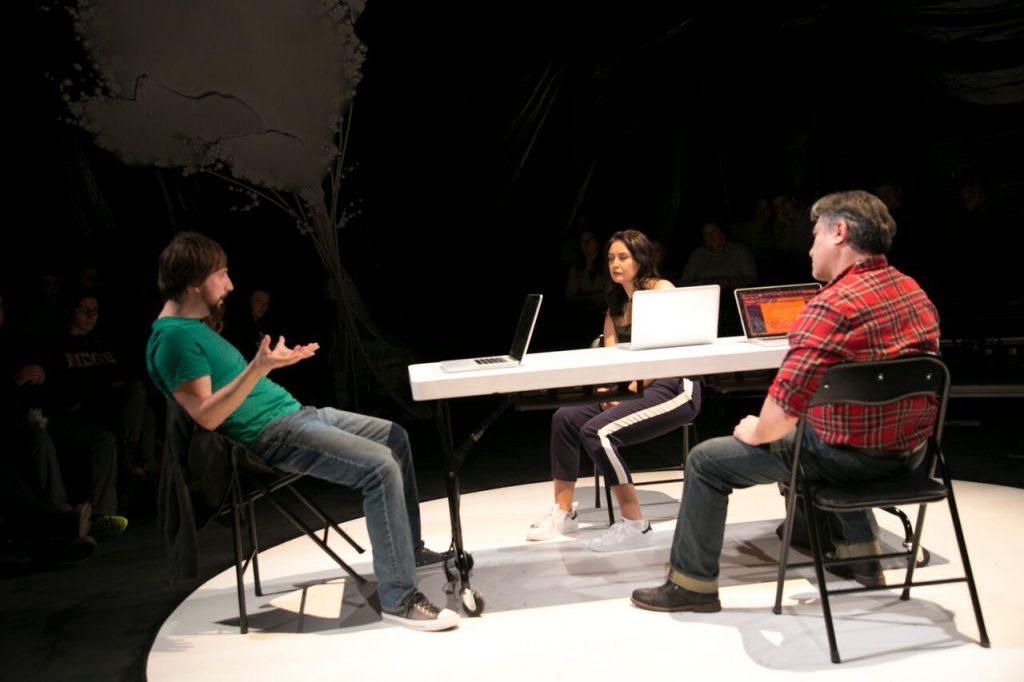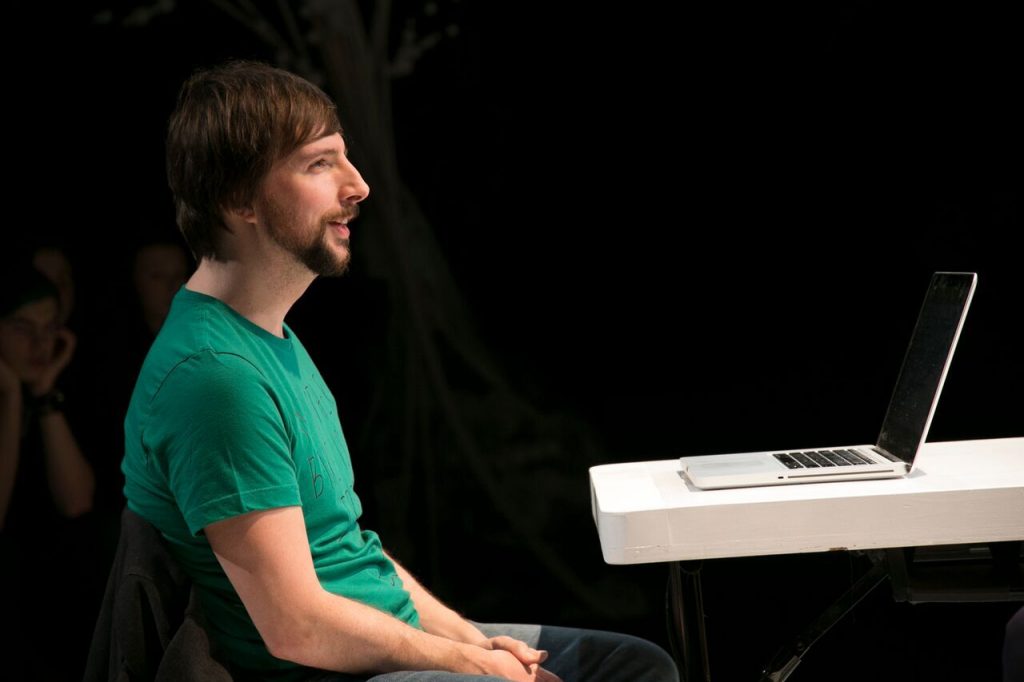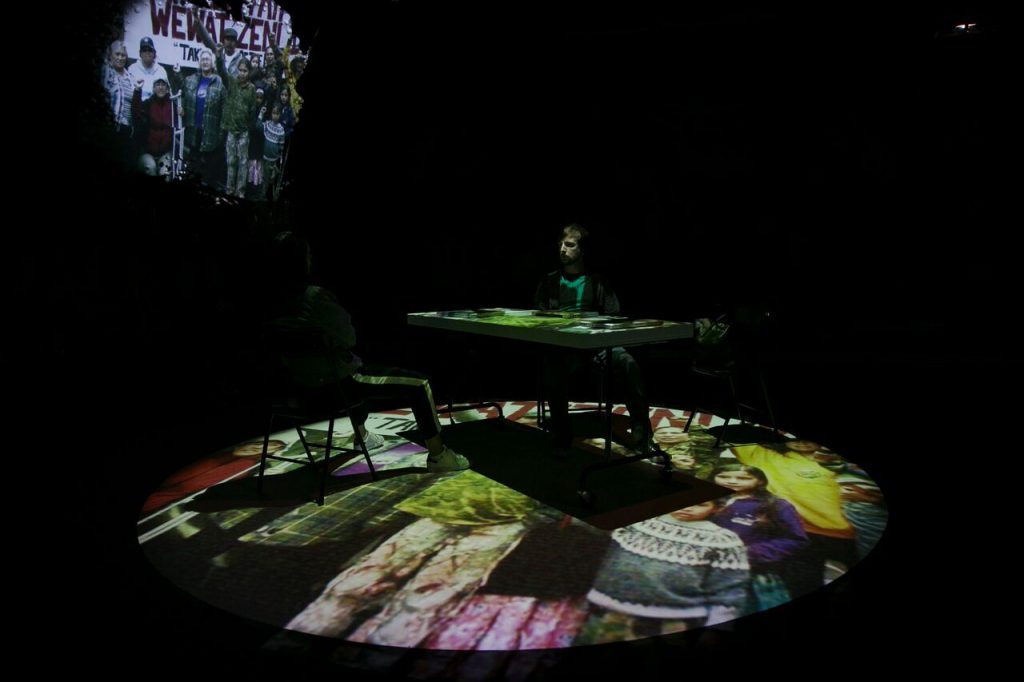
Credit: Matt Reznek
At Gateway Theatre (Studio B), March 9-11 and 14-18, 2017
604-270-1812/gatewaytheatre.com
Posted March 12, 2017
Quelemia Sparrow is a First Nations writer/actor from the Musqueam Nation. She does her best to live gently on the land, consume modestly and eat thoughtfully: “I think about the pigs. But I LOVE bacon.” There’s the rub. Her philosophy? “Eat nothing that could be a pet.” Like the rest of us, she’s embarrassed by some of her choices.
Actor/playwright Kevin Loring is Nlakap’amux from the Lytton First Nation. While he wants to do the right thing, he’s got a wife and two kids so he drives a 4-wheel drive SUV. Sure, he’d like to drive a Tesla but who can afford it?
Sebastien Archibald unapologetically tells us right off the top, “I’m white, male, the embodiment of privilege” and in The Pipeline Project he plays devil’s advocate, joining the ranks of what he calls, “first world assholes.”
Guilt. For Archibald it began with Catholic guilt, then he added David Suzuki guilt and Al Gore guilt and now First Nations guilt. I think we can be pretty sure Archibald isn’t really a “first world asshole”. He rides a bike and I’ll bet he recycles, too. But The Pipeline Project needs someone or something to rub up against and Archibald is it.

Credit: Matt Reznek
Sparrow, Loring and Archibald play themselves in this ITSAZOO Productions/Savage Society production in association with Gateway Theatre and Neworld Theatre.
Inspired by veteran director John Cooper’s frustration at his own passivity in the face of environmental disaster, Sparrow, Loring, Archibald and Chelsea Haberlin (who directs this world premiere with the assistance of Cooper) created The Pipeline Project out of conversations they had over a period of years.
The first half of the evening is comprised of three-way conversations that touch on unceded First Nations territory, residential schools, salmon stocks, the Mt. Polley mine disaster, consumerism and the twinning of the Kinder Morgan pipeline. The most mind-boggling part of this first half is a detailed re-enactment of Enbridge’s field staff trying to figure out what to do when a 6-foot rupture in the pipeline began spilling in excess of one million US gallons of diluted bitumen into Talmadge Creek, a tributary of the Kalamazoo River. It was eighteen hours before any action was taken. Thirty-five miles of the Kalamazoo River had to be closed to recreation; it was two years before parts of it were reopened. From Wikipedia: “Other sections of the river remain restricted because of the ongoing cleanup of the tar sands oil product called diluted bitumen (dilbit) the pipeline had been transporting.” Read the report and weep: https://en.wikipedia.org/wiki/Kalamazoo_River_oil_spill.
No one has come up with a solution for cleaning up dilbit and with Prime Minister Justin Trudeau’s recent approval of the expansion of Kinder Morgan’s pipeline and tanker facilities at Westridge Terminal on the shores of Burrard Inlet, this is a disaster that could be coming our way.
Archibald not only plays the ‘bad guy’ but he’s the major comedic force as well. With material this heavy, somebody has to play the clown and Archibald is it: “I have a culture: social justice, craft beer and, uh, video games . . . . I guess I don’t have that [a culture] then.”
The second half of the evening is a ‘Talk Forward’ that starts off with a conversation between director Haberlin and a guest speaker (different each evening) and eventually opens up to the audience. Each night Haberlin asks the speaker to leave the audience with one single action to take away. On opening night the speaker was Linda Solomon, founder and editor of The National Observer, Canada’s leading source of investigative journalism. Her suggestion was that we support independent media where we can find in-depth reportage and intelligent analysis of the news.
There is in The Pipeline Project an inherent problem: I suspect most people who would go to see The Pipeline Project are already pretty well informed. We already feel the frustration that led Cooper to bring this group together. But the show is never heavy-handed or didactic; the openness and playfulness of the actors keep the audience engaged. The problem, as always, is how to reach the uninformed and unmotivated.

The Pipeline Project is intelligently directed by Haberlin and Cooper and beautifully staged. Lauchlin Johnston’s set is evocatively lit by Conor Moore whose projection on the floor ripples like clean, clear water, a recurring touchstone.
There is passion and commitment in this show and it will take presentations like this as well as non-violent protests, peaceful marches, support for the First Nations whose land is being trammelled and loud proclamations of our opposition to turn the tide. Most of all, it means changing the minds of politicians in whose hands our future lies.

